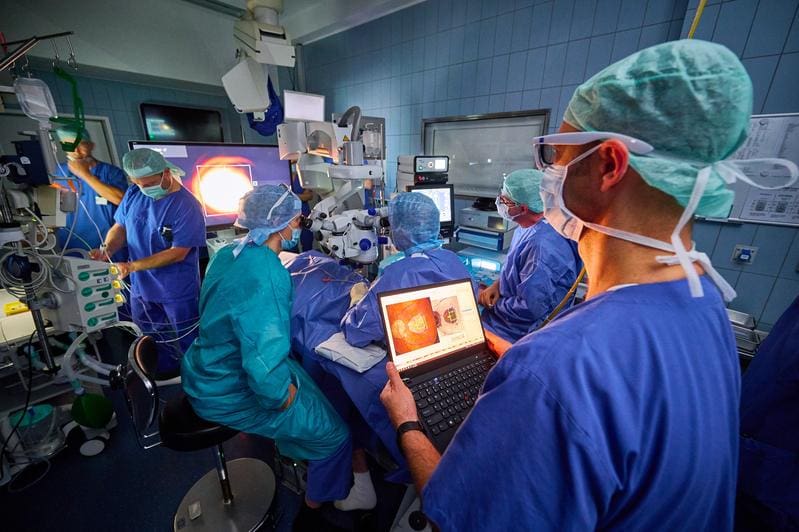Microchip Implant Partially Restores Vision in AMD Patients
In an international study, it has been possible for the first time to partially restore central vision in patients with geographic atrophy, a severe form of age-related macular degeneration (AMD). The innovative subretinal microchip implant led to significant improvements in visual acuity in over 80 percent of the participants. More than 84 percent were able to recognize letters, numbers or words again after implantation.
The results of the interdisciplinary team led by the Department of Ophthalmology at the University Hospital Bonn and in cooperation with the University of Bonn have been published in the New England Journal of Medicine.
In AMD, the retinal cells responsible for converting light into electrical impulses die. The 2 x 2 millimeter and 30 micrometer thin PRIMA implant is implanted under the retina and takes over the function of degenerated photoreceptors. Infrared light is projected onto the implant via special glasses, which converts it into electrical signals. These signals excite intact retinal cells and generate visual perceptions in the brain’s visual cortex.

38 people from 17 clinics in five countries took part in the study. After twelve months, visual acuity improved significantly in 81.3 percent, by at least ten letters on the ETDRS eye chart. Peripheral vision remained stable. The implant was well tolerated, with most side effects occurring in the first eight weeks.
The technology marks a milestone in the treatment of geographic atrophy and allows for partial restoration of vision, unlike previous therapies that only slow down progression. An independent Data Safety Monitoring Board recommended approval in Europe, as the benefits outweigh the risks.
The implant is aimed at patients with advanced dry AMD and loss of central vision. Further developments on image processing and wearing comfort are in the works, and approval procedures in Europe are underway.
Original Paper:
PREVIEW: The German Congress of Laboratory Medicine (DKLM) 2025 promises exciting insights into the interface between science and clinical practice. Under the motto “Science for Precision Medicine”, the German Society for Clinical Chemistry and Laboratory Medicine (DGKL) and the Umbrella Association for Technologists and Analysts in Medicine Germany (DVTA) invite experts from research, clinics and industry to meet on October 23 and 24 at the Congress Center Leipzig (CCL). The two-day event is aimed at laboratory physicians, biomedical analysts and decision-makers to discuss current advances in diagnostics and strengthen networks. The ceremonial opening of the congress will take place on 22 October with the presentation of the MedLabAwards in the Salles de Pologne.
Editor: X-Press Journalistenb├╝ro GbR
Gender Notice. The personal designations used in this text always refer equally to female, male and diverse persons. Double/triple naming and gendered designations are used for better readability. ected.




